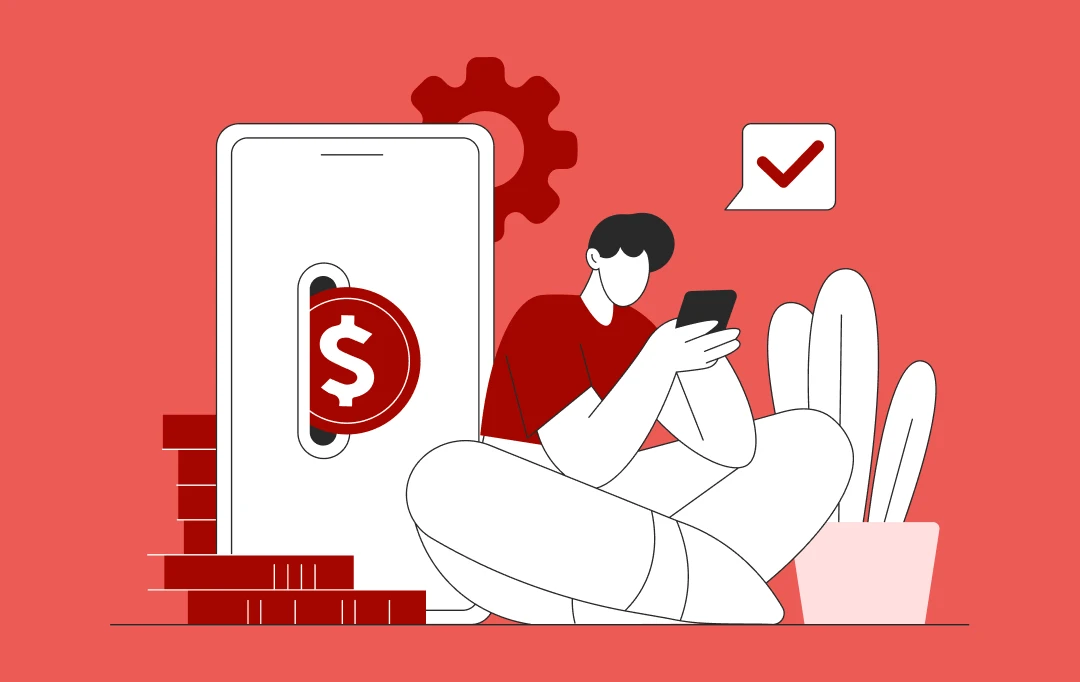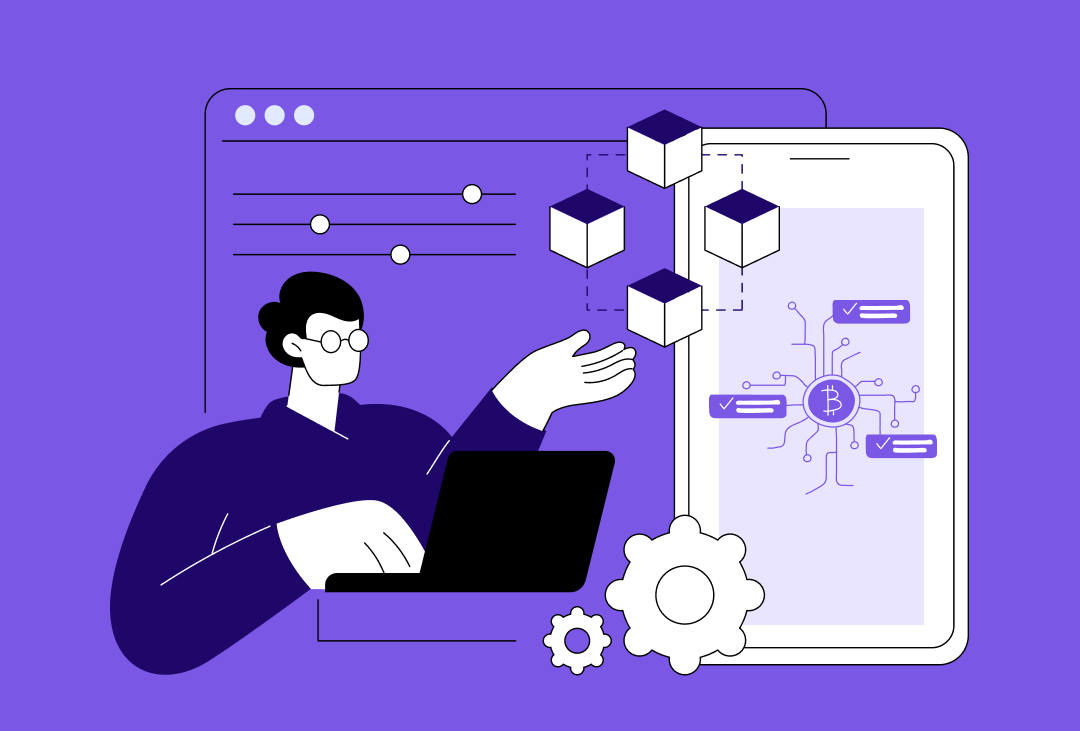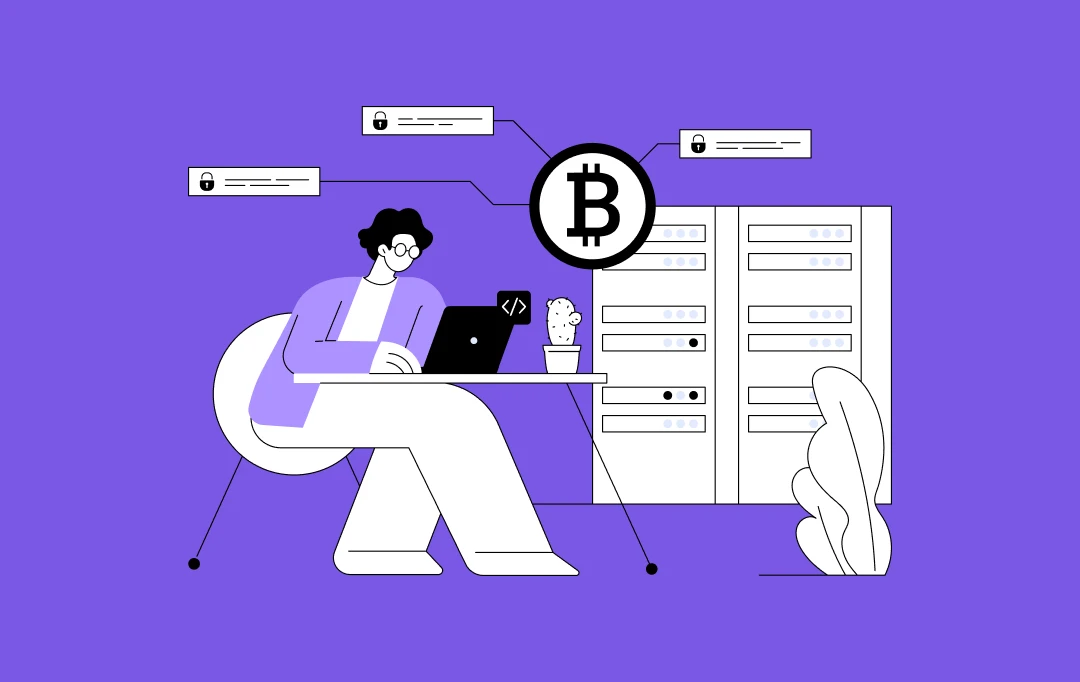- Connecting Blockchain and IoT: A Powerful Blend
- IoT Challenges that Blockchain Resolves
- Poor security
- No liquidity
- Lack of trust
- Lower scalability
- Higher processing overhead cost
- Blockchain-IoT Use Cases
- Smart Homes
- Healthcare and Pharmacy
- Automotive
- Fintech
- Sharing economy
- Benefits of Blockchain in IoT
- Enhanced Security
- Improved Transparency and Trust
- Cost and Time Efficiency
- Scalability and Interoperability
- Increased Data Privacy
- How can Appinventiv Help You Leverage Blockchain in IoT?
- FAQs
The Internet of Things (IoT) connects devices and objects to the Internet, enabling them to share data and communicate. This connection creates endless opportunities for creating and deriving value from these connected things. For instance, smart sensors and chips are embedded into everyday objects, such as household appliances or wearable devices, that can collect valuable data and transmit it to a network.
The use of powerful analytics tools to analyze this collected data can prove beneficial in gathering valuable insights and making informed decisions, leading to improved business operations and increased efficiency. However, it is also vital to know that IoT devices are increasingly susceptible to cyberthreats due to the lack of robust security measures surrounding them. These issues must be taken seriously to fully realize the benefits of IoT without compromising privacy or exposing vulnerabilities to potential attacks.
Well, this is where Blockchain in IoT(aka Blockchain of Things) comes into play.
Blockchain technology can transform the entire economy and make it imperative for everyone to look ahead to a decentralized future. It has already become a major disruptive emerging constituent of the contemporary internet-enabled era of technology.
Blockchain and the Internet of Things (IoT) enable transactions between connected devices. Blockchain acts as a database where transactions are recorded, checked, and shared among all connected devices.
Blockchain in IoT allows machines to communicate and make transactions without relying on a central authority. This means that smart devices can operate independently, making their own decisions.
The combination of IoT and Blockchain also keeps track of how devices interact with each other, creating a transparent and secure system. This allows the Blockchain IoT devices to work together seamlessly and efficiently.
This blog will help you understand everything related to Blockchain in IoT, its multiple use cases, and its benefits. In addition to looking at various applications of blockchain-IoT development, we will also help you understand the various challenges of implementing IoT technology and how Blockchain can help resolve them.
But first, let us take a refreshing look at Blockchain in IoT and how these two interconnect.
Connecting Blockchain and IoT: A Powerful Blend
Integrating IoT and Blockchain allows a distributed network of devices to securely exchange data and interact without relying on a centralized authority. Transactions are validated and recorded across multiple nodes, making it difficult for any malicious activity or tampering to occur due to the decentralized nature of the Blockchain.
Cryptographic algorithms and consensus mechanisms in blockchain technology guarantee secure and confidential data transmission between IoT devices. Industries like healthcare, supply chain management, and energy, where the exchange of sensitive information and real-time communication are critical components, can benefit from using resources that combine Blockchain and IoT. By ensuring data confidentiality and integrity, blockchain technology provides a secure and tamper-proof solution for these sectors.
In conventional IoT systems, intermediaries or central authorities are frequently required to oversee transactions and validate data authenticity. Now, IoT devices can engage in direct transactions and secure communications with each other by utilizing blockchain technology, thus, eliminating the need for intermediaries and increased expenses and delays associated with third-party involvement.
According to recent reports, the Blockchain in IoT market size was valued at $134.41 million in 2021 and is expected to reach $1.974 billion in 2030, witnessing a CAGR of 73.5% from 2022 to 2030. The blockchain-IoT development market is experiencing rapid growth due to the increasing adoption of Internet of Things (IoT) technologies. Businesses and industries recognize IoT’s potential to improve operational efficiency and enhance security. As a result, there is a growing demand for blockchain solutions to address the unique challenges imposed by IoT devices.

IoT Challenges that Blockchain Resolves
Despite the growing advancements in this ecosystem and businesses & investors showing an interest in learning about IoT trends, the market still suffers from various issues. A few of these are as follows –

Poor security
IoT enables multiple devices to access, exchange, and share data within the ecosystem. However, without human supervision and authentication standards, it becomes much easier for hackers to hack any of the devices, use them as an entry point into the network, and steal private and confidential information. In other words, the following types of security concerns possibly exist-
- Software attacks – The connected device is infected via malware, such as viruses.
- Physical devices attack – This involves unauthorized device control.
- Network attacks – Here, wireless vulnerability and denial of service attacks are considered to ruin the IoT ecosystem.
- Encryption attacks – Activities related to password cracking are brought into practice in this scenario.
In this scenario, Blockchain for IoT helps with keeping a real-time track of the history of all the connected devices and sensor data, checking for content duplicity from harmful data sources, and providing consensus algorithms to ensure identity verification and security advantages.
What’s more, Blockchain acts as a decentralized database, making it difficult for anyone to gain access to sensitive information by hacking a particular centrally controlled system.
No liquidity
By integrating blockchain in IoT, liquidity can be addressed with the help of secure and decentralized mechanisms for transactions and value exchange. Blockchain is capable of offering the means to create digital tokens or cryptocurrencies that can represent asset ownership. These tokens can be utilized within the IoT environment to facilitate transactions between devices. This integration allows for a more streamlined and efficient process of value exchange, thereby enhancing the overall functionality and effectiveness of the IoT ecosystem.
Lack of trust
Another challenge prevailing in the IoT marketplace is a lack of trustability.
Since every digital device can connect to the IoT network and gain access to information independently, there is a higher risk of collision and distrust. The solutions offered by a top blockchain IoT software development company like Appinventiv can fill this gap and add trust to the ecosystem with the involvement of Blockchain in the IoT ecosystem by leveraging the characteristics of transparency, immutability, and decentralization.
Lower scalability
Since IoT systems operate via centralized architecture, connecting billions of devices into the same network is becoming increasingly tougher. An impact of which is the rise in network issues and cyberattacks.
Blockchain technology introduces smart contracts in the networks that enable devices to function anonymously and securely by creating agreements that execute only when a specific task is completed.
Higher processing overhead cost
Various third parties are being asked to check and authenticate each micro-transaction to ensure security in the IoT network. This is not only a time-consuming process but also an expensive affair.
Blockchain-based smart contracts mitigate these challenges by introducing the power of automation and eradicating third-parties dependency.
Now that we have studied what Blockchain means to IoT, let’s look at some of the blockchain IoT applications across industries.
Blockchain-IoT Use Cases

As you might have already known, a global supply chain entails many stakeholders like brokers and raw material providers and many payments and invoices. This makes the process complicated, time-consuming, and with less-to-no transparency. Besides, the risk of delivery delays is also common.
Here, adopting Blockchain in the supply chain management process introduces transparency and ease of payments and saves time & cost by removing intermediaries and decentralizing the ecosystem. The technology empowers businesses to enjoy a secure data exchange and a tamper-proof repository for cargo documents and shipping events, resulting in fewer delays and fraud.
Whereas IoT enhances traceability throughout the shipment process by empowering machines to share details in real-time across the network.
This way, the combination of Blockchain and IoT (aka Blockchain of Things) helps companies cope with the challenges related to supply chain and logistics.
Smart Homes
Smart homes are one of the finest Blockchain-IoT use cases that have redefined the fusion of two technologies. Various smart home organizations are embracing Blockchain technology to make the data gathered and shared by smart devices immutable and prevent the risk of hacking.
One of the famous blockchain IoT examples is Comcast. It employs a permission-based ledger that enables smart home product users to grant access permissions remotely to others from their devices, such that these permissions can be revoked at any time. This could be particularly useful in situations like giving a virtual key to your house to a friend.
Healthcare and Pharmacy
Healthcare and pharmacy are other industries that are revolutionizing with the adoption of Blockchain and IoT. The two technologies are helping the industry mitigate its traditional challenges like lack of data security, longer wait time, data inconsistency, and higher attached costs.
While the former technology eases the impact of clinical research and drug development, supply chain management, and patient medical verification by introducing the power of a decentralized distributed ledger and immutability of data, the latter ensures end-to-end connectivity and data sharing in real time.
Likewise, Blockchain speeds up the processes by replacing third-party intermediaries with smart contracts. IoT in healthcare allows the practitioners and pharmacists to get familiar with any uncertain medical signs and prepare for new chronic diseases quickly and efficiently.
Automotive
Automotive is also one of the vital applications of blockchain and IoT. The industry depends on the two disrupting technologies to leverage a wide range of benefits such as –
The two technologies are easing the process of finding a vacant space for parking and automating the payments via crypto wallet, making it termed smart parking.
Another one of the famous blockchain IoT applications includes RFID tags. Car manufacturers are finding it easier to ensure proof of provenance for the spare auto parts and track the exact location of any particular car in the IoT-connected world with the help of RFID tags. In contrast, Blockchain is helping with storing and sharing this information globally in the form of a publicly distributed ledger.
Blockchain of Things (BIoT) is also making it possible for customers to claim insurance immediately and effortlessly using the power of smart contracts.
Fintech
Again, Fintech is also experiencing a significant change in its working environment with the advent of Blockchain and the Internet of Things.
When talking about the role of Blockchain in Fintech, the technology is helping with reducing paperwork, making data immutable and publicly accessible, performing transactions in the form of cryptocurrencies, identifying money laundering issues, and much more.
At the same time, IoT is changing the fintech scenario by offering many benefits such as immediate support and personalization services, introducing smart banks and ATMs, enhancing spending visibility, and assessing risk related to insurance and loan. Furthermore, Blockchain supports payments between devices, making the web of devices immune to hacking and malware attacks.
Sharing economy
The sharing economy is another Blockchain-IoT use case that is gaining huge momentum in integrating both technologies. The technologies enable companies to consider each property and device, be it a house, car, washing machine, or bed, as an IoT-connected device and share or sell on lease to others in the network without involving third-party intermediaries. Something you will be able to understand better by looking into the working of Slock.IT, a real-life use case of Blockchain and IoT in the sharing economy.
Benefits of Blockchain in IoT
Implementing Blockchain in IoT can offer a secure, transparent, and efficient infrastructure for data exchange, thereby increasing trust and improving business outcomes across various industrial niches. Let us look at multiple benefits of Blockchain in IoT in detail:

Enhanced Security
Integrating blockchain technology with IoT allows a decentralized and tamper-proof system to record and validate transactions effectively. By utilizing advanced cryptographic algorithms, Blockchain ensures the integrity and authenticity of data transmitted between IoT devices and prevents unauthorized access. The immutable nature of blockchain technology provides an additional layer of protection against malicious activity and can easily safeguard the blockchain in IoT security and confidentiality.
Improved Transparency and Trust
The use of Blockchain in IoT makes the record and storage of transactions and data exchanges in an IoT network rather transparent. This further leads to increased trust among the stakeholders as they can easily verify and audit the records by checking the transaction history. Furthermore, the fusion of these two technologies also helps increase data accountability by tracking the origin and movement of goods across the IoT network.
Cost and Time Efficiency
Blockchain technology can facilitate direct peer-to-peer transactions and data exchanges between IoT devices while eliminating the need for intermediaries or central authorities. This results in reduced costs and minimized delays in transaction settlements. Apart from this, the use of blockchain technology in IoT makes way for removal of unnecessary layers of communication, simplifying the complex IoT ecosystem.
Scalability and Interoperability
Applying blockchain technology in IoT networks facilitates seamless data sharing and exchange between various devices and platforms. The decentralized nature of Blockchain enables the integration of multiple IoT systems, irrespective of their hardware or software configurations. This ability to scale and interoperate encourages creativity and supports the development of complex IoT applications.
Increased Data Privacy
Blockchain technology gives users increased authority over their data, enhancing overall privacy. The use of Blockchain in IoT allows users to determine which information is shared, who has access to it, and the specific conditions under which it can be accessed. This level of control is vital for IoT networks, as it allows individuals to safeguard their data and comply with relevant data protection regulations.
How can Appinventiv Help You Leverage Blockchain in IoT?
The fusion of Blockchain and IoT technology can transform numerous industries and revolutionize their interactions with technology. Using Blockchain in IoT offers unprecedented opportunities in supply chain management, asset tracking, healthcare, energy, and more. With improved data integrity, streamlined operations, and enhanced automation, companies that embrace this technology stand to gain a competitive edge in an ever-evolving digital landscape.
We offer custom development services that enable businesses to streamline their operations by harnessing the potential of Blockchain in IoT. Our adept development team specializes in integrating blockchain technology with IoT devices and systems, ensuring the integrity and security of data. They can create and implement smart contracts that automate processes and enable self-executing transactions.
Through our blockchain development services, companies can establish transparency and traceability throughout their operations, bolstering efficiency and fostering trust. As a dedicated blockchain IoT development company, our business solutions, which merge the power of Blockchain and IoT, can allow you to optimize operations, enhance security, and unlock the full potential of cutting-edge innovation in business process simplification. Furthermore, out blockchain and IoT development services can empower businesses to achieve greater productivity by leveraging the decentralized and transparent nature of blockchain technology
Get in touch with our experts to avail customized business solutions, as per your requirements!
FAQs
Q. What are the advantages of blockchain in IoT?
A. The various advantages of blockchain in IoT includes:
- Enhanced Security and Privacy
- Increased Transparency and Traceability
- Improved Efficiency and Cost Savings
- Decentralization and Elimination of Middlemen
- Immutable and Tamper-proof Records
- Streamlined Supply Chain Management
Q. What is an example of an IoT blockchain system?
A. The “IOTA” project is one of the most famous blockchain IoT examples. IOTA is built for IoT and uses a unique distributed ledger technology called the “Tangle” that allows the devices to transact with one another directly, thereby creating a decentralized network.
IOTA facilitates secure communication and transactions between IoT devices, enabling machine-to-machine microtransactions, and data transfer without intermediaries. The IOTA network is lightweight, scalable, and feeless, making it ideal for various IoT applications, including smart cities, supply chain management, and autonomous vehicles.


- In just 2 mins you will get a response
- Your idea is 100% protected by our Non Disclosure Agreement.

How Much Does It Cost to Develop a Crypto Wallet App Like Metamask?
Key takeaways: Developing a MetaMask-like crypto wallet can cost anywhere from $30,000 to $250,000+, depending on the complexity of features and integration. The cost breakdown includes development, security, integration with blockchain networks, and ongoing maintenance. A customized wallet opens up new revenue opportunities, brand differentiation, and long-term business growth. Since its launch in 2016, MetaMask…

How Much Does it Cost to Build a Blockchain App in the UAE?
Key takeaways: The UAE blockchain market is rapidly expanding, with the BFSI sector capturing over 50% of the market share. As blockchain adoption accelerates, development costs in the UAE range from AED 55,000 to AED 1.85 million, depending on app complexity and features. Factors such as platform selection, security measures, and third-party integrations directly impact…

How Blockchain Integration Is Optimizing Business Processes in Dubai
Key takeaways: Blockchain is a strategic enabler in Dubai, transforming traditional business workflows by enhancing efficiency, transparency, and automation beyond cryptocurrency applications. Dubai’s supportive regulatory environment and government initiatives (e.g., VARA, Dubai Blockchain Strategy) create a clear, innovation-friendly framework, accelerating blockchain adoption. Integration with legacy systems through modular blockchain solutions enables enterprises to modernize operations…


















